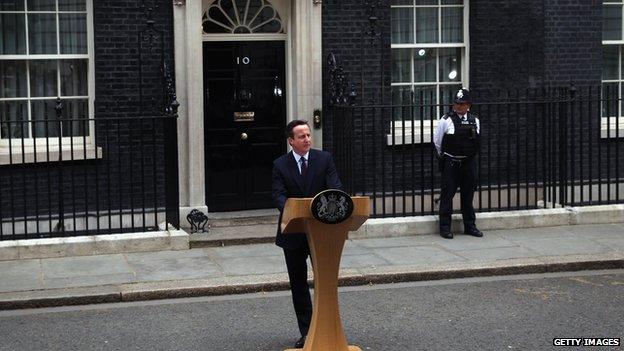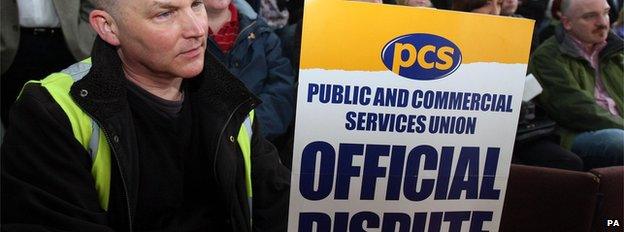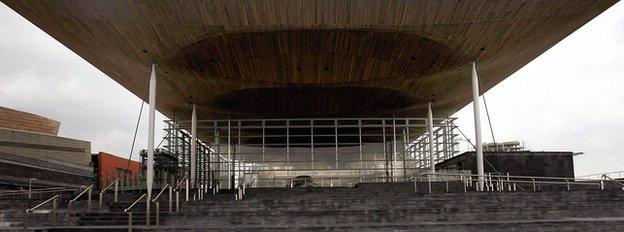What the Conservative government has pledged to do
- Published

The Conservative Party has a majority in the new Parliament and, in theory, the ability to pass whatever laws it wants. Here are some of the things the party has promised to do.

Key policies

Extra money for the NHS was a key pledge during the election campaign
Many of the party's main pledges were in its manifesto, but some were also made later in the election campaign. The party said it would:
Introduce a law guaranteeing no rise in income tax rates, VAT or national insurance before 2020
Invest an extra £8bn a year for the NHS by 2020
Hold a referendum on membership of the EU by 2017
Open 500 more free schools
Extend the right-to-buy scheme to housing association tenants in England
Build 200,000 starter homes
Ensure all people who work 30 hours per week on the minimum wage pay no income tax
Double free childcare allowance for three and four-year-olds to 30 hours
Increase the inheritance tax threshold on family homes to £1m by 2017
Make sure there are no above-inflation rises in rail fares until 2020
Below are some of the other key pledges made in the party's manifesto

Economy
Running a surplus by 2018
A crackdown on tax evasion and the "aggressive" avoidance of tax
Spending £100bn on infrastructure over the five-year term

Jobs and investment

Rules for strikes will be changed under the party's plans
Achieving full employment by helping businesses create two million extra jobs over the course of the next Parliament
Creating 3 million new apprenticeships
Replacing Jobseeker's Allowance for 18-21 year-olds with a Youth Allowance time-limited to six months. After that, they will have to take an apprenticeship or traineeship or do community work to claim benefits
Requiring 40% of those entitled to take part in strike ballots to vote for a strike before industrial action can be held
Requiring companies with more than 250 employees to publish their gender pay gap - the difference between average pay for male and female employees
Increasing the minimum wage to £6.70 by the autumn and to £8 by the end of the decade
Investing £6.9bn in the UK's research infrastructure up to 2021

Taxation and welfare
Taking everyone who earns less than £12,500 out of income tax
Passing a new law that would mean all those working 30 hours a week and earning the minimum wage will not pay income tax on earnings
Raising the threshold for the 40p rate of tax so that nobody under £50,000 pays the rate
A freeze on working age benefits for two years from April 2016 (exemptions for disability and pensioner benefits)
Lowering the benefit cap from £26,000 to £23,000 (with exemptions for those receiving Disability Living Allowance or the Personal Independence Payment)

Immigration

The party will cap skilled migration from outside the EU at 20,700
Negotiating new EU rules so people will have to be earning in the UK for four years before they can claim tax credits and child benefits
Introducing a four-year residency requirement for social housing for EU migrants
Ending the ability of EU jobseekers to claim any job-seeking benefits
Requiring EU jobseekers who have not found a job within six months to leave
Insisting new EU member states' citizens do not have free movement rights "until their economies have converged much more closely with existing member states"
Cap the level of skilled migration from outside the EU at 20,700
Extend the "deport first, appeal later" principle to cover all immigration appeals and judicial reviews, apart from asylum cases

Education and the NHS

The Tories pledge to give people the right to a named GP
Investing £7bn over the course of the next Parliament to provide "good school places"
Protecting the schools budget; increasing the amount spent on schools as the number of pupils increases
Scrapping the cap on higher education student numbers
Providing same-day GP appointments for over 75s

Heritage, sports and government

The party pledges more powers for the Welsh Assembly
Freeze the BBC licence fee
Guarantee those who work for a big company and the public sector entitlement to Volunteering Leave for three days per year
End taxpayer-funded six-figure pay-offs for the best-paid public sector workers
Reduce number of MPs to 600
Introduce English votes for English laws
Give English MPs a veto over matters only affecting England
Implement the recommendations of the Smith Commission, set up to consider new powers for Scotland after the independence referendum
Increase some powers for the Welsh Assembly
Devolve corporation tax powers to the Northern Ireland Assembly

Justice
Scrap the Human Rights Act, and introduce a British Bill of Rights
Strengthen counter-terrorism powers
Create new Extremism Disruption Orders, which the party says would help target those trying to radicalise young people on social media

Pensions and inheritance
Increasing the inheritance tax threshold for married couples and civil partners to £1m
Continuing to increase the state pension through the triple lock system, meaning it rises by at least 2.5%
Capping charges on residential care
Introducing a single-tier pension

Foreign affairs and defence
Protect the UK economy from further integration with the eurozone while reclaiming other powers from Europe
Uphold commitment to spend 0.7% of gross national income on international development
Maintain the size of the regular armed services and not reduce the Army to below 82,000
Expand armed forces reserves to 35,000
Retain Trident and build a new fleet of nuclear submarines

Others

Giving Parliament a free vote on repeal of the Hunting Act
Ending any new public subsidy for onshore wind farms